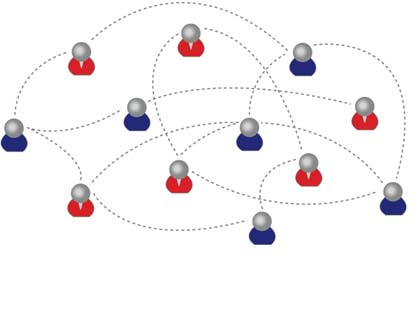From the earliest times, human communities required cooperative behavior for survival, and it is clear that ancient patterns of social coordination imprinted institutional practices and beliefs that still shape our contemporary world. Recent decades have witnessed a great surge of new interest in civil society. Scholars, commentators, and political actors of all stripes have debated the concept, universally acknowledging its centrality to the rise of modern democracy while disputing its definition and function. It remains a contested and elusive idea, simultaneously animating and complicating contemporary debates about the nature of political life.
We are all members of civil society. Just as citizens relate to the state and family members relate to domestic life, we all connect to one another in society through a network of values and institutions that define us as actors in the civil sphere. The quality of our participation in private and public life is in fact closely intertwined with the character of our actions in civil society.
A major concern today is that the very impulse to protect and invigorate individual preferences may diminish a broader sense of social bonds and trust necessary for collective action. The growth of exaggerated individualism in civil society becomes clearly one of the preeminent public concerns for liberal democracy.
To the degree that civil society’s ability to balance the pursuit of private interest with public well-being is diminished, to that degree is liberal democracy endangered. The health and evolution of civil society thus has profound importance for the unfolding of political life in the 21st century.
For The French philosopher Jean Jacques Rousseau, civil society resulted from the degeneration of a basically good state of nature. Man’s problems arose because of civil society. He believed that the state of nature changed because it was internally unstable. For example, because talents were not distributed equally among persons, the balance that existed in the state of nature was disturbed and with inequality came conflicting interests. The more talented, able, and intelligent people brought about advances in science, technology, commerce, and so on. Because people simply are born with certain natural endowments, a person cannot be praised for having talent or blamed for not having it. Rousseau saw talent as naturally leading to achievement. Inequality developed as some people produced more and earned more. He failed to acknowledge the importance of motivation, industry, and volitional use of one’s reason and other potentialities.
Rousseau observed that although life was peaceful in the state of nature, people were unfulfilled. They needed to interact in order to find actualization. Evil, greed, and selfishness emerged as human society began to develop. As people formed social institutions, they developed vices. One such institution was private property that encouraged greed and self-interest. Rousseau viewed private property as a destructive and impulsive institution that rewarded greed and luck. Hence, civil society was born when people began fencing off their property, claiming that it was theirs, and finding that other people agreed with them.
The perspective of many of today’s environmentalists can be traced back to Rousseau who believed that the more men deviated from the state of nature, the worse off they would be.
Rousseau seems to strongly believe that a government is only truly “free” if all of its citizens have the ability to voice their opinions and vote. The natural levels of inequality based on age, gender, and race that are apparent in the state of nature, are eliminated with the creation of a civil society and “social contract”.
Everything changed as civil society developed, but permission was not given for things to change. He contends that it is wrong to change the condition of all without asking. Rousseau is concerned that some people become relatively poorer without having lost anything. Not only are their feelings hurt, their right to stagnate has been violated. The poor, weak, and indolent did not want to change, but things around them changed, forcing them to steal or receive subsistence from the rich.
He thought private property to be the source of social ills. He considered that private ownership of property tended to corrupt men and destroy their character and regarded the man without property to be the freest. Although he did not actually support the abolition of private property, he believed that private property should be minimal and should be distributed equally among the members of the society.Rousseau anticipated the need for the state to minimize private property. He wanted the property of the state to be as great and powerful as possible, and that of the citizens to be as small and weak as possible. With private property being so limited, the state would need to apply very little force in order to lead the people.
John Locke’s central belief is that society is set up to protect the individual’s personal property and to avoid disputes over property. These disputes can either be local or international, and can go as far as causing civil, or world wars.
In Locke’s social contract, men have unequal amounts of possessions on earth, which is contrary to the understanding of Rousseau. What seems to undermine Locke’s reasoning is the fact that Locke’s underlying basis for man having personal property is that there is enough to go around for everyone. I find this reasoning to be completely flawed based on society today.Comparing Locke and Rousseau is not as black and white as it may appear. Both believe in the power of the “civil society,” but for different reasons. Each of the thinker’s reasoning ultimately lead to one point that the power of the community to provide protection; whether it be for an individual’s personal property, or for the protection of the society as a whole.

